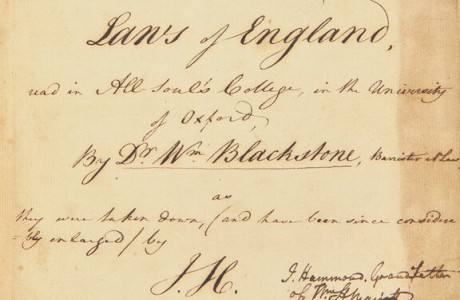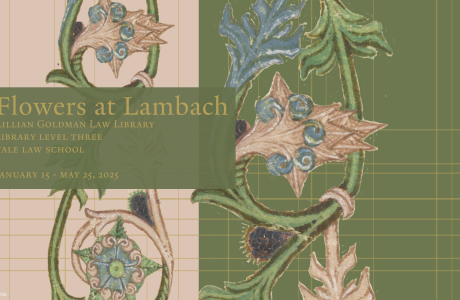Freedom of the Seas, Part 3
Freedom of the Seas, 1609: Grotius and the Emergence of International Law
An exhibit marking the 400th anniversary of Hugo Grotius’s Mare Liberum
Part 3
The tension generated by Spanish and Portuguese claims to maritime dominion intensified at the start of the 17th century. An exponential growth in world trade and, especially, aggressive efforts by the Dutch East India Company to protect its right to engage in it, brought the issue to a head. The Company was organized by the Dutch government in 1602 with a view to expanding the capital base, and enhancing the collective security, of the individual ship owners and captains who up to that point had had to fend off Spanish and Portuguese naval vessels on their own.
The stage was set for a dramatic confrontation. It took place in February 1603, when a small fleet belonging to the Company attacked and overwhelmed a richly laden Portuguese vessel, the Santa Catarina, near Singapore. The captured vessel and cargo were brought back to the Netherlands, where a Dutch court ordered the proceeds of its sale distributed to the Company, the admiral of the fleet and his crew. A furious row erupted over the legality of the seizure, which struck many as immoral – in fact, scarcely distinguishable from outright piracy.
The case presented complex legal issues. The need to defend its right to participate in the East India trade had arisen in the course of the young Dutch republic’s war of independence against Spain, which by then held dominion over Portugal and regarded the Dutch as no more than rebellious subjects. Moreover, as some of the Company’s dissident shareholders themselves pointed out, the Company had been organized as a private mercantile enterprise, not as a vehicle for engaging in an aggressive war, much less for enriching itself in the process.
Some of the shareholders threatened to withdraw their capital, to form a new enterprise in competition, even to make common cause with a French company projected by Henry IV. The Company’s very existence was thought to be at risk – and with it the future of the young republic’s burgeoning overseas commerce.
To win over popular support, the Company turned to Hugo Grotius (1583-1645), then only twenty-one years old and too new to the practice of law to have been hired to handle the Santa Catarina litigation itself, but already renown throughout Europe for his prodigious erudition, his knowledge of the wisdom and practices of nations from biblical and classical times. Henry IV himself had greeted Grotius’s arrival in France as a fifteen-year-old diplomatic attaché by having a medal struck in his honor, declaring the young man to be nothing less than “the miracle of Holland.” In effect, Grotius’s defense of the Company’s position was tantamount to a celebrity endorsement, as valuable to the Company in this respect as by the persuasiveness of whatever legal argument he could muster in support of its actions.
Grotius immediately set about preparing a treatise that would portray the Company’s action in the context of a comprehensive theory of the law of prize. But before he could finish it, it had already been overtaken by events. The dissident shareholders had made good on their threat, to the extent of withdrawing their capital, but had failed to organize another company or to persuade the French to do so. Just as important, the Company’s commercial success had precipitated a change in public sentiment, effectively silencing critics of its aggressiveness. Moreover, and perhaps even more critically, an end was in sight to Holland’s decades-old war of independence from Spain. The moment, perforce, was inauspicious for a verbal assault on Spain and Portugal’s claims to a global monopoly. Grotius’s monograph, substantially completed by 1604, went unpublished – for the time being.
Grotius seems to have been dissatisfied with the work, anyway. In a letter written in November 1606, he says: “My little work on Indian affairs is finished, but I do not know whether it ought to appear in its present form, or only those parts which relate to the general law of war and prize.”
By 1608, however, events had taken another turn. The Company was becoming increasingly alarmed over reports that, in pursuit of a truce with Spain and of obtaining its recognition of Dutch independence, the Dutch government was prepared to concede Spain’s right to’exclude the Dutch from the eastern seas. At the Company’s urging, Grotius returned to his manuscript, rewriting the introduction and expanding the conclusion of one of its chapters, Chapter XII – the one in which he dealt specifically with the legal basis of the freedom of the seas.
This one chapter, entitled Mare liberum, was published the following spring, by itself, as a pamphlet. No mention was made of the identity of its author (although the fact that it was none other than the celebrated Grotius quickly became known locally and in England). The rest of the monograph was consigned to Grotius’s personal papers. Though alluded to in his private correspondence, its existence was practically unknown until a manuscript copy was discovered nearly three centuries later and published, in 1868, under the title De jure praedae (On the Law of Prize).
– Notes by Edward Gordon

Grotius, Hugo (1583-1645). De jure praedae commentarius [facsimile] (New York, 1952).
A facsimile of the manuscript Grotius completed in 1604, showing Chapter XII, which was published five years later as Mare liberum.
Rare Book Collection, Lillian Goldman Law Library.

Grotius, Hugo (1583-1645). De jure praedae commentarius (The Hague, 1868).
Rare Book Collection, Lillian Goldman Law Library.

Grotius, Hugo (1583-1645). Mare liberum (Leiden, 1618).
The 2nd edition of Mare liberum, and the first to bear Grotius’s name.
Rare Book Collection, Lillian Goldman Law Library.

Grotius, Hugo (1583-1645). Hugo Grotius Mari libero et P. Merula De maribus (Leiden, 1633).
This edition includes a related work on maritime affairs by the Dutch scholar Paulus Merula.
Rare Book Collection, Lillian Goldman Law Library.

Grotius, Hugo (1583-1645). Vrye zeevaert (Haarlem, 1636).
An early Dutch translation of Mare liberum.
Rare Book Collection, Lillian Goldman Law Library.
“Freedom of the Seas, 1609: Grotius and the Emergence of International Law,” curated by Edward Gordon and Michael Widener, is on display October 2009 through January 2010 in the Rare Book Exhibition Gallery, Level L2, Lillian Goldman Law Library, Yale Law School.


